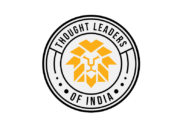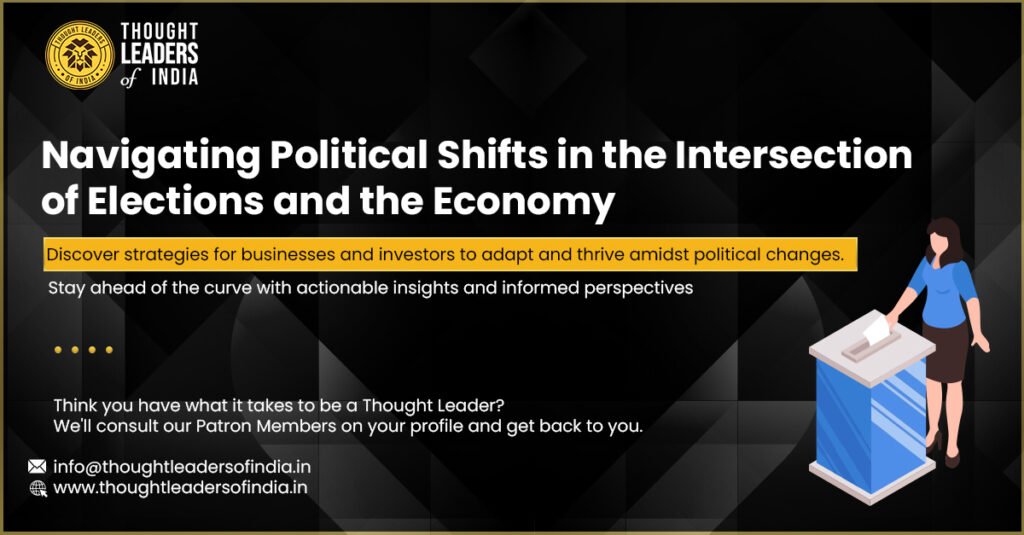Step into the fascinating world where elections meet economics, shaping the destiny of nations with every vote cast. Understanding this relationship is vital for business leaders, policymakers, and citizens alike. Join us as we explore how elections influence economic policies, markets, and the overall financial landscape, with a particular focus on the Indian context.
Picture this: It’s election season in India, a time when the entire nation holds its breath. Political rallies fill the air with promises and visions for the future. But beyond the colorful banners and passionate speeches lies a complex interplay between political decisions and economic realities.
Elections are more than just a democratic exercise; they are pivotal moments that can reshape economic policies and market sentiments. When a new government comes into power, it often brings new priorities and policies, which can impact everything from taxation to trade, from infrastructure projects to social welfare programs. Imagine a scenario where a pro-business party wins the election. The stock market, in anticipation of business-friendly policies, might surge, reflecting investor optimism. Conversely, the prospect of regulatory changes or increased public spending can create uncertainty, leading to market volatility. In India, the impact of elections on the economy is profound. Consider the 2014 general elections, where the promise of economic reforms and development led to a significant rise in market indices. Businesses geared up for growth, foreign investors poured in, and consumer confidence soared. Fast forward to 2019, and we saw how continuity in leadership with the re-election of the same government brought stability and a clear economic agenda.

Elections as Catalysts for Economic Change
Elections are a cornerstone of democracy, providing citizens the power to shape their government’s priorities. In India, the world’s largest democracy, elections are a vibrant, dynamic affair that significantly impacts the economy. Every electoral outcome, whether at the national or state level, carries the potential to alter economic policies and strategies. Imagine a bustling marketplace where every vote is a whisper that collectively roars, directing the course of a nation. Elections are the heartbeat of democracy, each one a pulse that sets the rhythm for governance and policy-making. In India, the world’s largest democracy, elections are a grand spectacle of color, energy, and anticipation, reverberating through every city, town, and village. Picture the streets during election season: vibrant with banners, posters, and rallies, as political leaders passionately address the masses, each promise and policy proposition eagerly analyzed by the public. These elections, whether at the national or state level, hold the power to pivot economic strategies, influence market confidence, and steer the country’s financial future. Consider the 2014 general elections, where the promise of economic reforms and development led to a surge in market optimism, lifting the stock market to new heights. Similarly, in state elections, policies on agriculture, infrastructure, and social welfare directly impact local economies, affecting everything from employment rates to the prices of everyday goods. In this intricate dance of democracy, every vote casts a ripple, and every election cycle becomes a testament to the collective will of the people, shaping not just the government but the economic landscape of the nation.
The Economic Implications of Election Promises
Political parties often campaign on economic platforms, promising reforms, subsidies, tax cuts, or increased public spending. These promises can have far-reaching consequences. For instance, in the 2014 general elections, the BJP’s promise of economic reforms and “Make in India” resonated with voters, leading to a mandate that significantly impacted India’s economic policies. The “Make in India” initiative aimed to transform India into a global manufacturing hub. This policy led to increased foreign direct investment (FDI) and the creation of numerous jobs, boosting the manufacturing sector’s contribution to the GDP.
The Pre-Election Economic Environment
The period leading up to elections often sees heightened economic activity. Governments may increase public spending to win favor with voters, resulting in short-term economic boosts. However, this can also lead to increased fiscal deficits, impacting long-term economic stability. According to a report by the Centre for Monitoring Indian Economy (CMIE), public spending in India saw a significant increase in the months leading up to the 2019 general elections, with a notable rise in rural development and infrastructure projects.
Market Reactions to Election Outcomes
Financial markets are highly sensitive to political uncertainty and election outcomes. Markets prefer stability and predictability, often reacting positively to clear mandates and negatively to uncertain or coalition outcomes. A study by the Indian School of Business (ISB) found that the Bombay Stock Exchange (BSE) Sensex typically experiences heightened volatility during election periods, with significant movements on the announcement of election results. The 2019 general elections in India saw a decisive victory for the incumbent BJP, leading to a surge in the Sensex and Nifty indices as markets responded positively to the prospect of policy continuity and stability.
Post-Election Economic Policies
The real test of an electoral mandate lies in the implementation of promised policies. Post-election, governments focus on enacting their economic agendas, which can include reforming tax structures, implementing welfare schemes, or deregulating industries. Following the 2014 elections, the Modi government implemented the Goods and Services Tax (GST), one of the most significant tax reforms in India’s history. While initially causing disruptions, the GST aimed to simplify the tax structure and increase compliance, eventually benefiting the economy.
The Role of Global Factors
In an increasingly interconnected world, global economic conditions also play a crucial role in shaping the impact of elections on the economy. Trade policies, geopolitical tensions, and global market trends can all influence the economic outcomes of electoral promises and policies. The US-China trade war had significant repercussions for global markets, including India. Election promises related to trade policies need to be viewed in the context of such global dynamics.
Navigating the Future: Strategies for Business Leaders
In the ever-shifting landscape of politics and economics, business leaders must don their strategic hats and become adept at reading the signs of change. With elections looming on the horizon, the air is thick with uncertainty, but therein lies the opportunity for those who dare to be proactive. Picture this: you’re at the helm of a company, navigating the choppy waters of today’s political climate. Elections are looming, and the potential economic policies of different political parties hang like a spectre over your boardroom discussions. But fear not, for knowledge is power, and strategic foresight is your compass. It’s time to roll up your sleeves and get proactive. Start by delving into the potential policy platforms of each political party. What promises are they making? How might these promises translate into real-world impacts for your industry? Take a deep dive into the nuances, analyze the data, and paint a vivid picture of the potential scenarios that lie ahead. But don’t stop there. Scenario planning is your secret weapon in the battle against uncertainty. Develop contingency plans for each possible election outcome, from the status quo to the most radical of changes. Anticipate the ripple effects on your business, your employees, and your bottom line, and craft strategies to mitigate risks and seize opportunities. Engage with policymakers and industry associations to stay ahead of the curve. Attend forums, participate in discussions, and lend your voice to the dialogue shaping the future of your industry. By staying informed and actively involved, you not only safeguard your business but also position yourself as a thought leader in your field. So, dear business leader, embrace the uncertainty of elections as a catalyst for innovation and growth. With strategic planning, proactive engagement, and a healthy dose of agility, you’ll not only weather the storm but also emerge stronger and more resilient on the other side.
Conclusion: Embracing the Dynamic Interplay
The intersection of elections and the economy is a complex, dynamic relationship that requires continuous monitoring and analysis. By understanding the economic implications of electoral processes and outcomes, stakeholders can better navigate the uncertainties and opportunities that arise. Join our exclusive TLOI community to stay updated on the latest insights and strategies for navigating political and economic shifts. Connect with industry leaders, policymakers, and thought leaders to drive impactful change in your organization and beyond.

